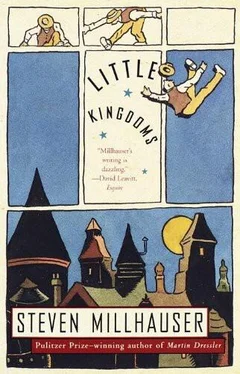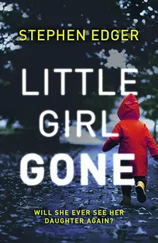The long hours of work, the four to five hours of restless sleep, the strain of an immense task requiring rigorous concentration, the sense of some menace lying in wait for him if he should relax his will for one second, all this began to tell on Franklin’s health, and by midwinter he fell sick. His arms felt heavy, he could barely hold up his head, the thermometer recorded a low, persistent fever; and after ten days of increasing exhaustion he called Dr. Shawcross, who found nothing more than a viral infection that was making the rounds but who warned of nervous exhaustion and ordered two weeks of bed rest. For one week Franklin lay in a stupor of mild fever, burning eyelids, and bone-deep weariness, during which Mrs. Henneman brought him bowls of soup and turkey sandwiches. Stella, as soon as she came home from school, sat on a chair by the side of his bed and from time to time took his temperature, carefully shaking down the mercury in the glass rod, telling him to be sure to keep the thermometer under his tongue, and timing him for three minutes by the second hand of his gold pocket watch. On the eighth day Franklin took the train to work. At his desk, with the drawing board sloped against his lap, he felt as if his brain were wrapped in cotton wool that itself was wrapped in crinkly blue paper; when he stood up he had an attack of dizziness and stood bent over his desk, supported on a trembling arm. He spent three more days at home before returning to work again; the fever had lifted, he was no longer dizzy, but he felt tired, always tired.
One night in the tower study Franklin looked up and saw through the unshaded window that it had begun to snow. The thick white flakes looked like shavings of wax from a candle. The snow lay in white lines on the black branches of the maples, it stood heaped on the wooden swing like the top of a loaf of bread. Only on the black river, gleaming faintly like dark tin, did it leave no trace. Color was coming to the world of animated cartoons, experiments had been made by more than one studio, and someone had already invented a workable sound track that produced synchronized sound effects, but Franklin knew that the truth lay with the winter night: the world was silent and black-and-white.
Night after night in the black-and-white winter, in the silent tower high over the house, Franklin sat bent over his silent black-and-white world, raising his eyes only to rest them before sinking back into his waking dream, and once, raising his eyes after a long and particularly stubborn sequence that left his neck aching and his temples throbbing, he was amazed to see the light of early morning shining in the window and there, outside, clusters of tender green-yellow flowers hanging from the branches of the maples. Butter-yellow and blood-red tulips glowed in the flower beds. Sunlight trembled on the green-brown river.
She had never called, never tried to visit the house, never asked for her clothes, her piano music, her oval photograph of Judge Vaughn and her mother. Her absence was absolute — she had crossed the river and vanished away. Franklin gradually stopped expecting her. A dull anger glimmered in him, like the shine of old tin. The rigor of her absence struck him as cold and unnatural, the result of a hard will. Once, relaxing his anger, he permitted himself to wonder whether the completeness of her absence, far from being a sign of contempt for her former life, might not be a sign of doubt, of secret shame, of midnight fear — a fear of seeing Stellas eyes, a fear that her romantic flight had been not daring but banal; but a moment later he imagined her throwing back her head to laugh in the sun — happy, flourishing, indifferent.
One summer midnight Franklin looked up from the drawing of a moon waterfall plunging into a chasm to see a piece of moon in the window. The moon, the luminous blue sky, the hot summer night reminded him of his roofwalk ten thousand years ago. He stood up and looked through the window; the world was blue and still, only the dark river shimmered with trembling points of light. He felt no boyish desire to walk through the window into the sky, but he was restless and needed a breath of night air.
On the second floor he stopped to look in at Stella, who lay fast asleep beside a book on her pillow. He moved the book away from her cheek and pushed up the fallen shoulder of her nightshirt. Then swiftly he descended the second stairway, opened the front door, and stepped into the radiant summer night.
Shadows of porch balusters lay sharp against the moon-bright floorboards. He walked down the porch steps. The night sky was flame blue. A memory came to him: as a child he had liked to look at the world through one of the dark blue circles of glass that his father removed from a little leather pouch to screw into the camera in front of the lens. The night sky was like that: a dark, transfigured day. Franklin wanted to walk; and after passing down the front path past the great maples to the hedge dividing the front yard from the road, he glanced back once at the house, dark except for the light in the tower, and continued on his way.
He knew and refused to know where he was going. He turned down several familiar lanes, breathing the smell of mown grass, loam, manure, the sudden sharp scent of some unknown flower. After a while he came to the deserted main street, lit by two street lamps. In the dark window of the general store he saw the reflection of a maple tree and a clapboard storefront and, through the reflection, a shadowy pyramid of soup cans. On the other side of the street he passed between two stores so close together that he could have touched the shingled walls on both sides. At the back of the stores was a weed-grown lot in which a rusty wheel lay aslant against the side of a rotting hay wagon, and a moment later he found himself on the bank of the river.
A few old rowboats and peeling oars lay outside the boat shed. Franklin pushed a boat into the water and began rowing upstream. Moonlight shone on the back steps of the drugstore, on iron-hooped barrels and piles of lumber; in a backyard garden a scarecrow wearing an old straw hat threw a long shadow across a stand of corn. Franklin was soon past the abandoned knitting mill that marked the end of the village. The water near the river’s edge was thick with grass and rushes, and he had to swing away from the bank. The woods on both sides were broken by an occasional dark house; here and there he saw a clearing with a bulldozer, and after a time he came to a well-lit house. It was set halfway up the hill, on the other shore. The house was obscured by the thick woods; from the rowboat he could hear the sound of voices, laughter. A party appeared to be in progress; Franklin could hear the chink of glasses. “Oh, absolutely!” a voice said, very sharply and clearly, before dropping back into the murmur. Through the dark Crosshatch of woods he could see patches of lamplit leaves and pieces of people moving in light on the front porch. A burst of high laughter seized his attention, aroused his deepest interest, but in fact he didn’t know, he couldn’t be certain. Something plopped lightly into the water — a frog? — and sent out ripples that began in shadow and, slowly widening, suddenly trembled in the brightness of the moon. After a while Franklin took up his oars and rowed home.
He sank back into his black-and-white world, his immobile world of inanimate drawings that had been granted the secret of motion, his death-world with its hidden gift of life. But that life was a deeply ambiguous life, a conjurer’s trick, a crafty illusion based on an accidental property of the retina, which retained an image for a fraction of a second after the image was no longer present. On this frail fact was erected the entire structure of the cinema, that colossal confidence game. The animated cartoon was a far more honest expression of the cinematic illusion than the so-called realistic film, because the cartoon reveled in its own illusory nature, exulted in the impossible — indeed it claimed the impossible as its own, exalted it as its own highest end, found in impossibility, in the negation of the actual, its profoundest reason for being. The animated cartoon was nothing but the poetry of the impossible — therein lay its exhilaration and its secret melancholy. For this willful violation of the actual, while it was an intoxicating release from the constriction of things, was at the same time nothing but a delusion, an attempt to outwit mortality. As such it was doomed to failure. And yet it was desperately important to smash through the constriction of the actual, to unhinge the universe and let the impossible stream in, because otherwise — well, otherwise the world was nothing but an editorial cartoon. In the long nights the thoughts came to him, streamed in on him, though mostly he merely watched them, a little distrustfully, out of the corner of one eye.
Читать дальше












